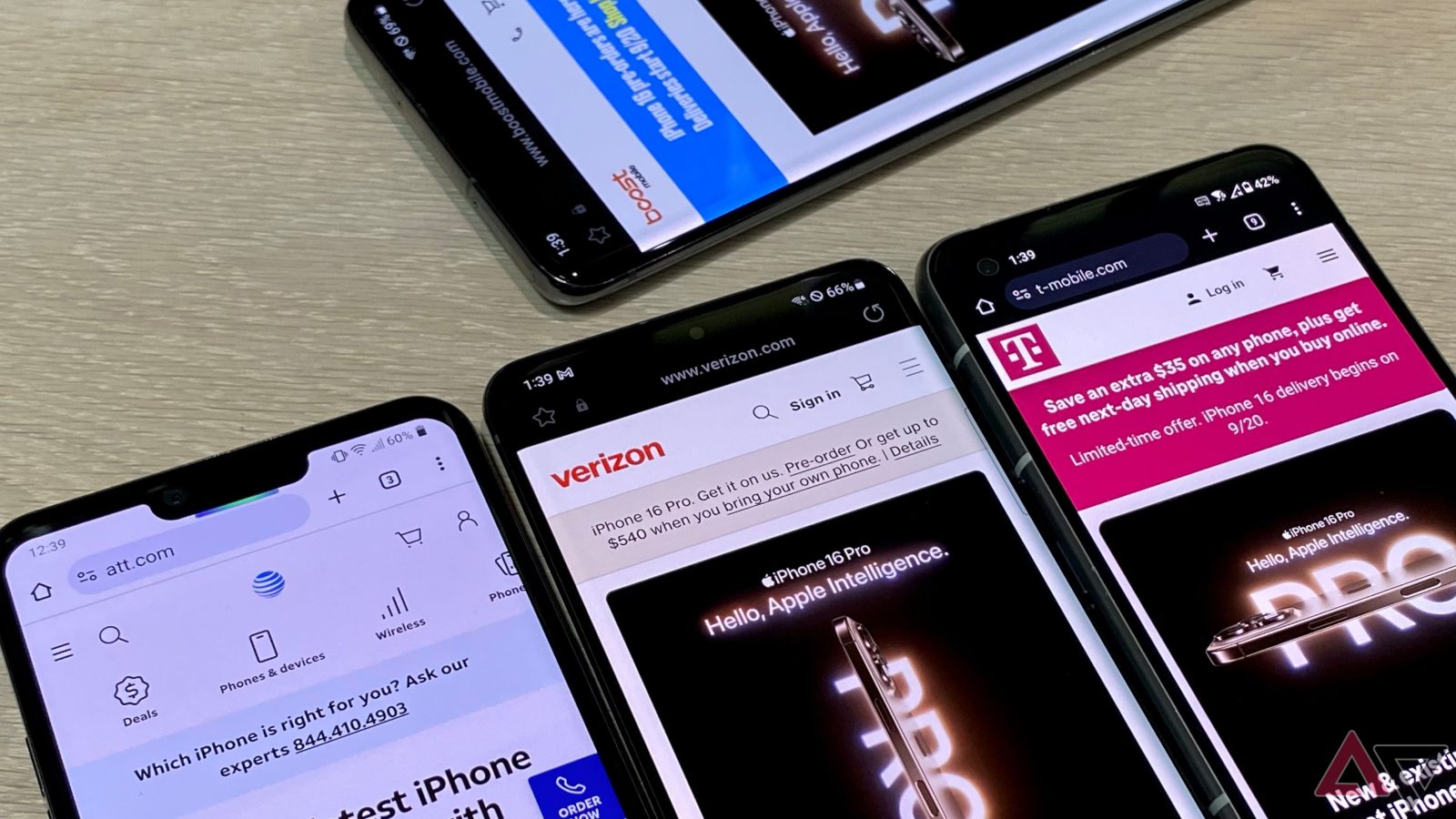
Contents
Phone service isn’t cheap. Many AT&T, Verizon, and T-Mobile customers see the advertised price and then face extra charges. This guide uncovers each carrier’s hidden fees, explains typical costs, and offers practical tips to save money.

Related
6 Understanding activation fees and finding savings

AT&T charges $35 for new postpaid lines and $15 for prepaid lines, with some exceptions. Online AT&T Prepaid plans often waive the $15 activation fee. Signature Program members, union members, students, and AARP members qualify for waived activation fees, plan discounts, and accessory savings. Verizon charges a $35 activation fee for new lines in-store and online. Customers with certified devices or in business or promotional programs may avoid it.
T-Mobile’s Device Connection Charge is $35 per line for postpaid activations and upgrades. Prepaid plans are exempt. Carriers run occasional promotions that reduce or waive the activation fee. You can use strategies to reduce or avoid these standard fees. Plan your purchases around promotional sales, back-to-school events, or loyalty offers to secure waivers or credits. Customers with long tenure, multiple line upgrades, or premium service tiers can negotiate fee waivers with customer service.

Related
5 How administrative and regulatory fees increase your bill
AT&T charges a $3.50 administrative fee per line each month. This fee covers network maintenance and regulatory compliance and is not a government-mandated tax. Customers pay Regulatory Cost Recovery Charges and federal surcharges, such as the Universal Service Fund (USF) fee. Verizon charges a $3.50 Administrative and Telco Recovery Charge per voice line.
Smaller regulatory fees and a USF surcharge can raise your bill by 15% to over 50%, depending on location. The administrative fee has increased over the years. You can reduce costs by switching to prepaid or MVNO plans. T-Mobile’s Go5G and Magenta plans include taxes and fees in the advertised price.
Other essentials and most prepaid plans incur a Regulatory Programs & Telco Recovery Fee of $3.99 per line. These charges recover carrier costs, not government taxes. These surcharges increase your total monthly cost. Knowing these charges and comparing carrier plans helps you avoid billing surprises and choose the best option.
4 Managing your data usage to skip overage fees

You face steep overage charges if you’re on a capped plan. Verizon charges $20 per extra gigabyte. A few video streams or app downloads can add $30 to $60 or more to your bill. Switch to Verizon’s Unlimited plans to eliminate overage fees. These plans slow data past thresholds but impose no extra charges. If you remain on a tiered plan, set usage alerts in the Verizon app at 50%, 75%, and 90% of your limit.
Change your plan mid-cycle to a higher tier and downgrade later. Some Verizon plans include Safety Mode, which slows data instead of charging extra when you reach your cap. AT&T customers on older metered plans face overage fees of $15 per extra gigabyte. AT&T Unlimited users don’t incur overage fees, though heavy use may slow speeds. Track data in the AT&T app and set usage alerts to avoid fees. AT&T also sells data add-ons with some plans, which can be cheaper if purchased in advance.
T-Mobile removed domestic overage charges. Most customers on these plans experience slower speeds after exceeding their cap, with no extra fees. After you exceed your high-speed limit, you continue using data at a reduced speed until the next billing cycle with no overage fees.
3 Planning to avoid bill shock from international roaming fees

International roaming fees can inflate your bill. Verizon’s TravelPass costs $12 per day in most countries. It provides unlimited talk, text, and high-speed data up to a limit, then slows to 3G. It costs $6 per day in Canada and Mexico, or is included in some plans. When TravelPass is set up, it activates automatically when your phone connects abroad, which can generate large bills, especially for families with multiple lines. Verizon’s pay-per-use roaming costs $1.79 per call minute, $0.50 per text, and over $2 per MB of data.
Frequent travelers can save with monthly international plans. Occasional travelers should disable TravelPass until needed and use a local SIM or eSIM for data. Manage background data and connect to Wi-Fi to prevent accidental activation. AT&T’s International Day Pass costs $12 per day on land and $20 on a cruise. It extends your regular plan to over 210 countries. AT&T charges $1 per minute for calls in Canada and Mexico without an international plan.
In Europe, calls cost $2 per minute. Elsewhere, including cruise ships and airlines, calls cost $3 per minute. Outgoing texts cost $0.50 each. Picture and video messages cost $1.30 each. Incoming messages incur standard domestic rates. Data costs $2.05 per MB on land and cruise ships. On airlines, it costs $10.24 per MB. AT&T charges the Day Pass when you use your phone abroad. If one line uses a Day Pass, additional lines cost $6 daily. This half-price rate saves money for groups.
T-Mobile offers the most travel-friendly service. T-Mobile does not provide a pay-per-use roaming option. Instead, international roaming is typically managed through a specific add-on plan or as part of an existing plan that includes international roaming benefits. Before traveling, check your plan details in the T-Mobile app to avoid surprise charges. Plan by downloading offline maps and managing background data to avoid extra fees.
2 How early termination fees can impact your phone plan
n”” data-modal-id=”single-image-modal” data-modal-container-id=”single-image-modal-container” data-img-caption=”” n
n””>

Although carriers, like the ultra-affordable Mint Mobile, dropped traditional service contracts, early termination fees (ETFs) still surprise customers. Verizon dropped two-year service contracts for most customers. Older plans and business account transfers still carry an ETF. Verizon capped ETFs at $175 for basic phones and $350 for smartphones, and prorated them over the contract term. New Verizon customers on device payment plans avoid ETFs, but they must pay the remaining device balance if they leave early.
T-Mobile doesn’t require service contracts and imposes no ETFs. Customers must pay any remaining device balance when they cancel.
AT&T ETF is $325 for smartphones minus $10 per full month of service. It’s $150 for basic phones, tablets, and connected devices, reduced by $4 per full month. Distinguish service contracts, which carry ETF risk, from installment plans, which only require paying off the device balance. Before canceling, check whether your plan includes a service commitment or an installment agreement. This ensures you avoid unexpected fees or large lump-sum payments.

Related
1 Miscellaneous carrier fees that can surprise you

Miscellaneous fees at Verizon, T-Mobile, and AT&T can accumulate quickly. Verizon charges a $50 restocking fee for phones returned or exchanged after purchase. It also imposes late payment fees of $7 or 5% of your balance, whichever is greater. Bounced checks incur up to $30. Missing Verizon’s paperless and autopay discount adds $10 per line to your bill.
T-Mobile charges late payment fees of 5% to $7. It applies a $20 reconnect fee for suspended accounts. Its restocking fee ranges from $20 to $70, based on device price. Using a live agent to pay triggers a $10 support fee. Avoid it by using self-service options. T-Mobile’s device insurance plans add $7 to $25 per month.
AT&T charges up to $8 for late payments, $30 for bounced payments, $36 to change your number, $35 to restore suspended service, and $5 for a paper bill reprint. It charges a $55 restocking fee for phone returns within the 14-day window. These fees are not hidden but often go unnoticed until they appear on your bill. Set up autopay, use self-service tools, decide on device returns promptly, and request fee waivers to avoid extra charges.
Stay ahead of hidden carrier fees
Hidden fees don’t have to catch you off guard. You now know what to watch on popular mobile plans. Review the fine print and monthly statements carefully. Plan your upgrades and travels strategically, leverage included services, and don’t hesitate to ask for fee waivers or discounts.
What’s your reaction?
Love0
Sad0
Happy0
Sleepy0
Angry0
Dead0
Wink0











Leave a Reply
View Comments